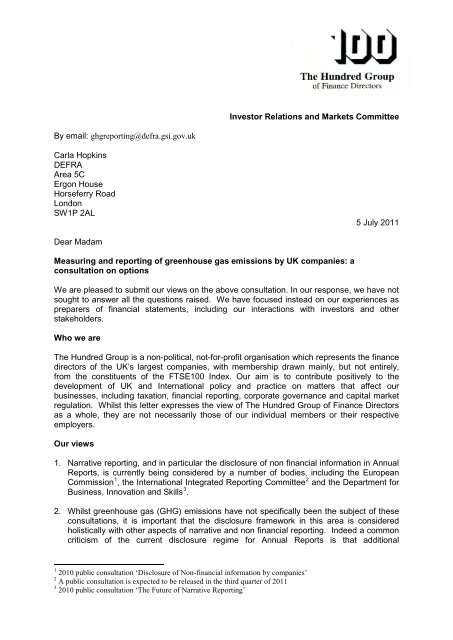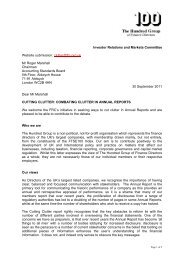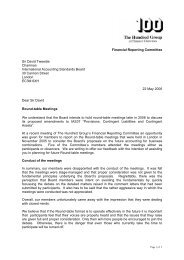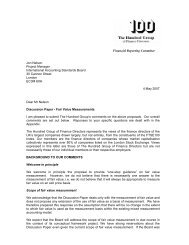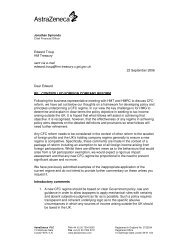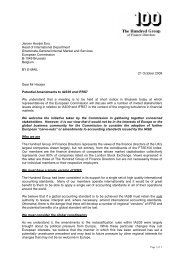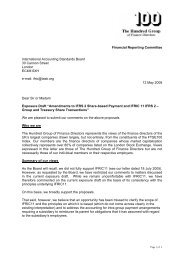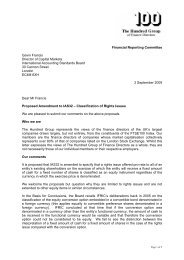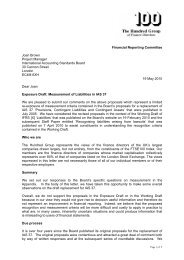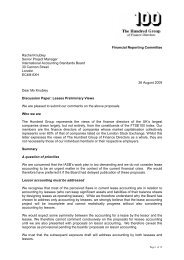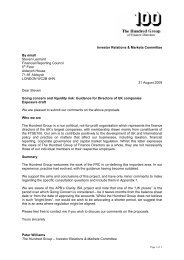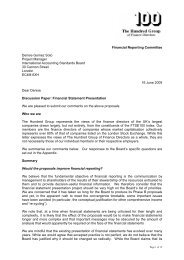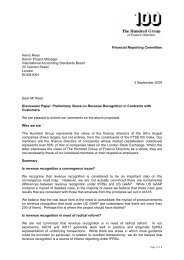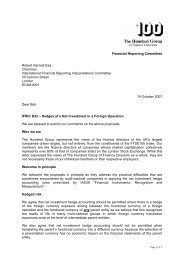Investor Relations and Markets Committee By email: ghgreporting ...
Investor Relations and Markets Committee By email: ghgreporting ...
Investor Relations and Markets Committee By email: ghgreporting ...
Create successful ePaper yourself
Turn your PDF publications into a flip-book with our unique Google optimized e-Paper software.
<strong>By</strong> <strong>email</strong>: <strong>ghgreporting</strong>@defra.gsi.gov.uk<br />
Carla Hopkins<br />
DEFRA<br />
Area 5C<br />
Ergon House<br />
Horseferry Road<br />
London<br />
SW1P 2AL<br />
Dear Madam<br />
<strong>Investor</strong> <strong>Relations</strong> <strong>and</strong> <strong>Markets</strong> <strong>Committee</strong><br />
Measuring <strong>and</strong> reporting of greenhouse gas emissions by UK companies: a<br />
consultation on options<br />
5 July 2011<br />
We are pleased to submit our views on the above consultation. In our response, we have not<br />
sought to answer all the questions raised. We have focused instead on our experiences as<br />
preparers of financial statements, including our interactions with investors <strong>and</strong> other<br />
stakeholders.<br />
Who we are<br />
The Hundred Group is a non-political, not-for-profit organisation which represents the finance<br />
directors of the UK’s largest companies, with membership drawn mainly, but not entirely,<br />
from the constituents of the FTSE100 Index. Our aim is to contribute positively to the<br />
development of UK <strong>and</strong> International policy <strong>and</strong> practice on matters that affect our<br />
businesses, including taxation, financial reporting, corporate governance <strong>and</strong> capital market<br />
regulation. Whilst this letter expresses the view of The Hundred Group of Finance Directors<br />
as a whole, they are not necessarily those of our individual members or their respective<br />
employers.<br />
Our views<br />
1. Narrative reporting, <strong>and</strong> in particular the disclosure of non financial information in Annual<br />
Reports, is currently being considered by a number of bodies, including the European<br />
Commission 1 , the International Integrated Reporting <strong>Committee</strong> 2 <strong>and</strong> the Department for<br />
Business, Innovation <strong>and</strong> Skills 3<br />
.<br />
2. Whilst greenhouse gas (GHG) emissions have not specifically been the subject of these<br />
consultations, it is important that the disclosure framework in this area is considered<br />
holistically with other aspects of narrative <strong>and</strong> non financial reporting. Indeed a common<br />
criticism of the current disclosure regime for Annual Reports is that additional<br />
1 2010 public consultation ‘Disclosure of Non-financial information by companies’<br />
2 A public consultation is expected to be released in the third quarter of 2011<br />
3 2010 public consultation ‘The Future of Narrative Reporting’
equirements have been bolted on over a number of years in response to specific issues,<br />
resulting in the presentation of extensive information in a manner that lacks coherence.<br />
3. Our members take very seriously their corporate, social <strong>and</strong> environmental<br />
responsibilities, particularly GHG emissions, not least because to minimise their<br />
environmental impact makes sound commercial sense, both from a cost <strong>and</strong> a<br />
reputational point of view. We are supportive of initiatives that promote a greater<br />
awareness of how we view this.<br />
4. The majority of our members already disclose information on the environmental impact of<br />
their companies, on the basis that this information is relevant to a holistic underst<strong>and</strong>ing<br />
of their business performance <strong>and</strong> is important to their investor community. The methods<br />
of disclosure vary, with some including it in Annual Reports, some presenting a separate<br />
Corporate Social Responsibility Report, whilst others communicate this information via<br />
their corporate websites.<br />
5. In our view, the Annual Report should include information required to fully underst<strong>and</strong> the<br />
historic performance of a company. This includes information over a company’s strategy,<br />
risks faced, the mitigation of these risks <strong>and</strong> subsequent analysis of performance. In<br />
certain circumstances this may be enhanced by disclosure of non-financial data. For<br />
example, an electricity generating company may wish to report on its level of GHG<br />
emissions, whereas a company with agricultural operations may report alternative<br />
environmental information such as water consumption which would be more relevant to<br />
the risks identified <strong>and</strong> the reputation of that company. The agricultural company may,<br />
however, decide to provide information on GHG emissions to shareholders <strong>and</strong> investors<br />
through another medium, such as its website, as the underst<strong>and</strong>ing constitutes a part of,<br />
but not a material part of, its business.<br />
6. What is key is that the disclosure framework should recognise that a ‘one size fits all’<br />
approach is unlikely to result in the presentation of higher quality, more relevant<br />
information in a manner most suited to its audience. Consequently, whilst we are<br />
supportive of m<strong>and</strong>ating the disclosure of GHG emissions, in our view the legislation<br />
should specifically cater for the option of disseminating information using a variety of<br />
media <strong>and</strong> should not focus solely on disclosure in the Directors’ Report.<br />
7. Recognising our concerns over the vehicle used to make the proposed disclosures, our<br />
favoured option within the m<strong>and</strong>atory disclosure framework is your option four (m<strong>and</strong>ate<br />
disclosure for all companies whose UK electricity consumption exceeds a threshold) on<br />
the basis that this will result in a meaningful disclosure of information only for those<br />
companies for whom GHG emissions are an important component of underst<strong>and</strong>ing their<br />
business performance.<br />
8. In response to your question on assuring any GHG data presented, we strongly support<br />
the view that the Directors of the Company should be clearly accountable for the<br />
accuracy, integrity <strong>and</strong> balance in non-financial reporting, through the auspices of the<br />
Audit <strong>Committee</strong>, who may rely on the internal audit function to provide a level of comfort.<br />
9. We do not believe that information outside the financial statements should be included in<br />
the remit for statutory audit, however we recognise that in certain circumstances<br />
stakeholders may benefit from non financial data being externally assured, either on a<br />
‘reasonable assurance’ or limited assurance’ basis depending on the identified need. A<br />
voluntary code which permits a separate assurance engagement – rather than an ‘audit’<br />
engagement – would be more appropriate <strong>and</strong> allow a more tailored approach.
Please feel free to contact me if you wish to discuss the views expressed in this letter.<br />
Yours sincerely<br />
Robin Freestone<br />
Chairman<br />
Hundred Group – <strong>Investor</strong> <strong>Relations</strong> & <strong>Markets</strong> <strong>Committee</strong>


